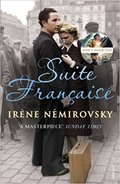 I recently came across a fascinating new book about the French writer Irene Nemirovsky. The Nemirovsky Question by the Harvard academic Susan Rubin Suleiman traces the fascinating and complex story of the author’s life, against a backdrop of French literary culture, emigre culture and secular Jewish culture. Nemirovsky was born in Kiev in 1903, the daughter of a successful Jewish banker. Her father’s family came from the Ukrainian city of Nemirov, an important centre of the Hassidic movement in the 18th century, where they had become successful grain traders. In 1918 the Nemirovskys fled revolutionary Russia for France, where they assimilated into French high society and Irene became a successful novelist. Prevented from publishing when the Germans occupied France in 1940, she moved with her husband and two small daughters from Paris to the relative safety of the village of Issy-l’Eveque. She died in Auschwitz in 1942. Nemirovsky’s background closely mirrors my own. My grandmother was born near Kiev in 1902, also to a family of grain traders. And like the Nemirovskys, my family was closely linked to Hassidism – my great-great-great grandfather was a special advisor to one of the sect’s most famous Rabbis, Reb Dovidl Twersky. Perhaps it was fate that took the Nemirovskys to France after the Revolution. They had initially fled to Finland, then Sweden. And maybe it was just luck that my family came to Canada. A cousin had ended up in Winnipeg before the revolution and much of the rest of the family followed over the next 20 years. And so my grandmother’s fate and that of Irene Nemirovsky were, mercifully, different. Nemirovsky started writing Suite Francaise, her most famous work to contemporary readers, in 1941, based on the events taking place around her. In her writing, she denounced fear, cowardice, acceptance of humiliation, of persecution and massacre. She had no illusions about the attitude of the inert French masses, nor about her own fate. She realised that her situation was without hope. When Nemirovsky was arrested and deported, her husband, Michel Epstein, did not understand that this would mean almost certain death. He expected her to return, and petitioned the authorities for her release on the grounds of poor health. He too was arrested and died in Auschwitz. Miraculously, their daughters survived, having fled with their governess and lived in hiding for the remainder of the war, taking their mother’s manuscript with them from one hiding place to another. In 2006 I happened to meet a charming middle-aged French couple while on holiday in France. When talking to them about my book, A Forgotten Land, the story of my grandmother’s early life in Russia in the early 19th century, they began to tell me about close friend of theirs called Denise, the daughter of a Jewish woman who had died during the holocaust. Denise had kept her mother’s wartime diary as a memento, but had found it too painful to read until decades after the war, when she discovered it was not merely a diary, but a powerful literary masterpiece. “Is this the daughter of Irene Nemirovsky?” I asked. They were surprised that I knew of her; the book had been published in French two years earlier, and in English only that very year. For my part, I felt privileged to have met friends of Nemirovsky’s daughter, and so soon after reading Suite Francaise, when its horrors and brilliance were still so fresh in my mind.
0 Comments
Leave a Reply. |
Keeping stories aliveThis blog aims to discuss historical events relating to the Jewish communities of Ukraine, and of Eastern Europe more widely. As a storyteller, I hope to keep alive stories of the past and remember those who told or experienced them. Like so many others, I am deeply troubled by the war in Ukraine and for the foreseeable future, most articles published here will focus on the war, with an emphasis on parallels with other tumultuous periods in Ukraine's tragic history. Archives
March 2024
Categories
All
|
 RSS Feed
RSS Feed
